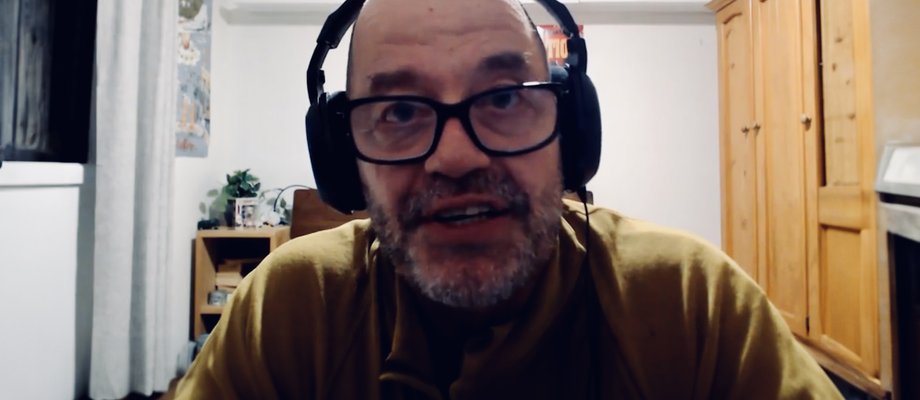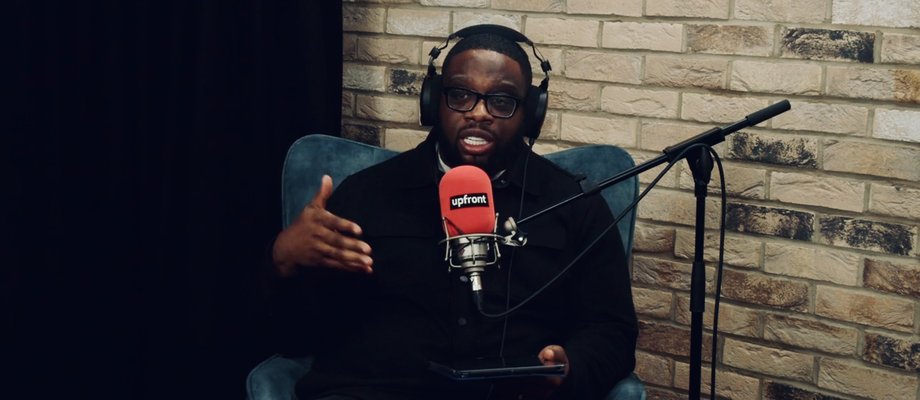In the sixth episode of the new series of the Upfront podcast, financial adviser Emmanuel Asuquo chats to mathematician and comedian Adam Spencer about worsening numeracy levels and its impact on our finances.
Here are some highlights from that conversation. Listen to the episode in full here.
Emmanuel: We're gonna go straight into it. Could a fear of maths or numbers be putting people off finance?
Adam: Certainly, if you were scared of numbers in general and long division sent a shiver down your spine, I think there is a chance you'd balk and think that finance is harder than that and something you couldn't confront at all. Ironically, being quite fluent in numbers, I don't put myself forward as an expert in financial management. Yeah, if numbers scare you, unfortunately, financial management and financial literacy would also leave you feeling a little bit short of breath.
Emmanuel: When did you realise that you were a numbers guy? Or, I like to see a numbers god. Because numbers, to me, are just amazing. And for anyone that can master them, it's almost god-tier level.

Adam: Yeah, I gave a TED talk a few years ago, and the phrase I used was that numbers were the musical notes with which the symphony of the universe is written. I think they're just the building blocks of everything. I always loved it at school. I was always sort of on top of or a bit ahead of what everyone else was learning. So I was lucky. It always came to me pretty naturally. I can't ever really remember having maths lessons going, well, that doesn't make sense.
Emmanuel: We're seeing numeracy levels in the UK and Australia are getting worse. What do you think are the consequences of this?
Adam: One of the stats suggested in Australia a couple of years ago was 40 percent of kids are being taught mathematics by someone who's not qualified to teach it. And, you know, I like to say, make me your child's French tutor, and in six months, I'll give you a kid who cannot speak French because I can't. I'm just not qualified. Make me your kid's tennis coach, Emanuel, and in 12 months, I'll give you a terrible tennis player because I'm just not qualified. Kids can smell fear, and if they're being taught by someone not really deeply attuned to a subject, they're not going to get it themselves. There will certainly be no deeper affection or understanding of the subject. We need more mathematically qualified teachers and more people who love maths and love numbers and are thinking about teaching at least as a part-time or ideally as a full-time vocation.
We need more mathematically qualified teachers and more people who love maths and numbers thinking about teaching.
Mathematician and comedian
Emmanuel: How would you fix the system?
Adam: I'd rather see a slightly smaller amount of maths taught in more depth, and the students who then need it at a specialist level, who might go on to do engineering, accounting, or something, can be catered for. But I'd rather have the general numeracy of more people also lifted by them not having to drop the arithmetic and race off to the trigonometry, and before they've had time for that to really absorb, go back to the calculus and then we've got to race over to financial mathematics.
Emmanuel: Do you think that maths should be more relevant? We should teach young people how to understand more practical things like budgeting, taxes, pensions, and interest rates? I remember feeling like if I didn't understand Pi, I wouldn't be able to make it in life. And I have not used Pi since I left school.

Adam: Yeah, okay, spoiler alert: You can probably get a fair way through life without a deep understanding of Pi. There is potential for tuning and tweaking any syllabus a little bit more to make it a little bit more relevant. I stare at some slabs of things and wonder why they're still there. It's one of the great things about this podcast: the more people who are financially literate, the more in control and able to control their own economics and finances, the better.
I miss the old days when you'd put your hands into your jeans pocket, and there was a 2 dollar coin there that you hadn't noticed. Happy days.
Mathematician and comedian
Emmanuel: How has a cashless society affected our understanding of maths and money?
Adam: I can remember myself as a child, and even with my kids, who are now 16 and 19, it was round at the local cafe, working out how much it would cost for lunch. And then eventually getting to the point of, okay, if you're going to add up the three things we've ordered and work out how much change we're getting, out of 50, I'll give you half of that change. And then suddenly, I had two little Einstein's running around. I do miss the old days when you'd put your hands into your jeans pocket, and there was a 2 dollar coin there that you hadn't noticed you had. Happy days.
Emmanuel: I remember we'd look for money. You'd lift the sofa and see if there's anything there. We had a little money jar, which we used to put change in. By the time you poured it out and added it up, you realised you had a decent amount of money there that you could actually go and buy something with. All of these things teach you about value.
Adam: Yeah, there was something positive in watching that accumulation process happen and having the discipline to leave it there for a little while. It's certainly a good skill to have.
I myself try to use humour to make personal finance relevant. I try to laugh people into making change.
Host
Emmanuel: Do you think there's shame in being unable to understand numbers? Do you think this might make people reluctant to talk to a financial advisor?
Adam: It's an interesting one. There's something about mathematics that makes it almost cool to be able to say that you're terrible at it. And if that's the case, I think there's a real risk of putting your own personal finances in the too-hard basket. I think the important thing for people to understand is when you're getting financial advice from someone, even if you don't really understand the mathematics behind it, and possibly, especially if you don't understand the mathematics behind it, you can still put your trust in someone else, and it's probably important that you do. If I go to a doctor and they tell me I've got some horrible illness, and I don't really understand how that illness works or how I got it or what to do about it, I'm still going to go to that person for advice on that illness. In fact, probably more so because they know something I don't. So I think there's a compelling case: if you're scared by numbers or don't like them, you have to find the courage to ask someone for financial advice.
Emmanuel: What do you think financial service providers can do to help people who feel that they're not great with numbers or switch off when anything's talked about money or numbers?
The great thing about it is mathematics just exists. If humans had never come along, four times seven is still 28.
Mathematician and comedian
Adam: You've got to find something to entice people into the conversation. Something simple, something clear, something that doesn't roll over the top of people with complexity and too much numbers and too much data. But a simple change to weekly instead of monthly payments will take X dollars off your current loan, Mark. Or, you'll be paying it down seven years faster. Something like that. Bang. Okay. Now I'm listening. Now I'm willing to trust you to take the conversation a little bit further.
Emmanuel: I know you use humour really well. How have you been able to put the two together? I, myself, try to use humour when it comes to finance and personal financing and make it relevant. I try to laugh people into making change. How have brought humor into something that seems so serious?
Adam: I have a phrase of, laugh while you don't even realise you're learning. That way, you can disarm people and get them interested in a conversation. I tend to find that a lot of the humour when I'm presenting, talking, or writing about mathematics comes from the reflection of just how unnaturally excited I'm getting about the subject myself. I think I'm often, in a lot of ways, the butt of the joke. So I think the first thing you've got to have is a genuine passion and enthusiasm on the part of the person who's telling the story. And if that person is telling you about helping you manage your finances, because at the end of the day, they truly want you to have a degree of financial independence you don't have now and if they want to gift that to you, and if that's what their mission and their drive in life is, if they're the sort of people who should be in that industry in the first place, you're halfway there.
Emmanuel: Finally, what changes would you like to see around the conversation regarding maths?
Adam: Oh, I just wish the beauty of the subject was more apparent to people. You know, poetry's great, and art is beautiful, but far and away, the most powerful device we have is numbers. It's the most powerful skill I think we humans have - to analyze, measure, rationalize, predict, and describe what's going on around us. Numbers are the tools that we use to do that. I just want to make as many people as possible fall in love with that. And the great thing about it is, mate, this thing of mathematics just exists. Like if humans had never come along, four times seven is still 28.
Emmanuel: Oh, I'm going to quote you an end. If humans didn't exist, four times seven still equals 28. I love that.
Listen to this episode here or wherever you get your podcasts.
Meet our guest
Adam Spencer
As Australia’s most popular mathematician, Adam has entertained and inspired educators, parents and kids with his joy for all things mathematical for decades. His TED Talk on Monster Prime Numbers has clocked over 2 million views and is regularly voted one of the top 10 best TED maths and science talks. He's been an iconic radio and television star, won improvised theatre competitions and once interviewed John Travolta in front of 75,000 people. He's also a leading conference MC and keynote speaker on AI, cyber security and the Chat GPT revolution.
Loved this?
Then listen up
Upfront is the award-winning podcast for the financial services industry brought to you by Iress. Series 3 is out now, featuring 10 brand new episodes and conversations that everyone working in financial services needs to hear. Listen to Upfront on your favourite podcast app and follow so you never miss an episode.





